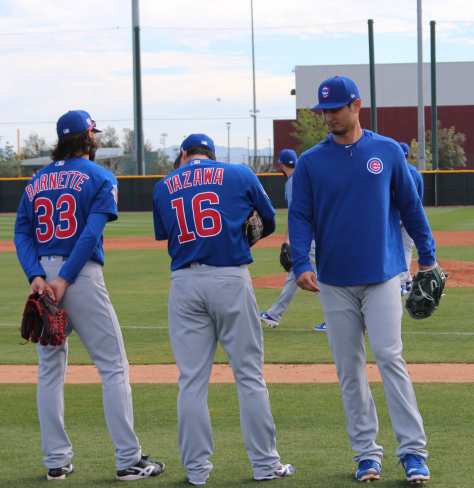
Good cheer and good hustle
Chicago Cubs pitcher Tony Barnette on Friday paid tribute to an overlooked aspect of Japanese baseball, its passion and fan-fueled competitiveness.
Asked what aspects of the game helped shape him as a player, the former Yakult Swallows closer cited the non-stop cheering and noise-making as more than just a part of the atmosphere, but something that adds to the amount o fight displayed between the lines.
“One thing I haven’t talked about much is the competitiveness of every single game,” he said. “The fan atmosphere helps with that. It doesn’t matter if you’re 10 games above .500 or 15 games below, they’re still showing up. That attitude adds to the competitiveness of the game, because a dead stadium is a dead stadium. It’s hard to get into it.”
“But as a player, you feel, if they’re still into it, we’re still into it. They’re not going to quit, we’re not going to quit. The more and more you win, the better it gets.”
“The passion is there, the caring is there. The heart and hustle is still there. You see the way guys bust it down the line, sliding head-first. As bad as that is, it’s still there. That’s one of the things that has stuck with me, is keeping that competitive level all the way through the game and all the way through the season.”
Pitcher Chris Martin, Barnette’s teammate last season with the Texas Rangers, said last November, that playing for Japan’s Nippon Ham Fighters prepared him to play in the majors by getting him used to executing pitches in high-pressure situations.
“One of the things people don’t give Japan credit for is it’s a competitive league with competitive players. The talent level may fall off a bit quicker, but the fact of the matter is guys are out there to win every single night and it’s good baseball.”
“It’s June and it’s Hanshin and there are 45,000 people in the stands or it’s July or it’s Tokyo Dome, and it’s the ninth inning and – off the bench because he was supposed to have a day off, here comes (future Hall of Famer Shinnosuke) Abe in the ninth inning and that place goes nuts. You get in that situation in that atmosphere, you’ve got to make a big pitch with 50,000 people screaming.”
“That has the big game mentality. Now when you get to the major leagues, it’s like, I’ve been in a stadium this big before. I’ve been in a stadium that’s more full than this. It’s a development thing.”
Giving credit where credit is due
On a personal level, Barnette credited one of his managers and his pitching coaches as huge influences. Manager Junji Ogawa took a team with promising talent and made them playoff contenders, largely by being patient. Under him, the Swallows got big seasons out of Barnette, Lastings Miledge and Wladimir Balentien. All three got big multiyear contracts, and though Miledge fell off the radar, Balentien went on to break Japan’s single-season home run record in 2013, while Barnette established himself as an elite closer.
“Junji Ogawa was instrumental in bringing me back after that first failed starter year, him and coach (Daisuke) Araki. They brought me back.”
“Araki ended up moving on, but then coach (former major leaguer Shingo) Takatsu came. He was such a great coach. His temperament as a pitching coach is just remarkable.” “And then Tomohito Ito. I played catch with that guy pretty much every single day for two years. When it came to the development of the cutter, the split, he’s got his hands all over it. His finger prints are all over the way I pitch today. I can’t talk about Japan without talking about Ito. I think he’s phenomenal in his craft and caring about each individual pitcher to work and get better, that organic way he cares about people. It’s seamless to him. Some guys have to work at it. It comes naturally to him and it shows. Phenomenal charisma. He’s a great guy to be around.”
